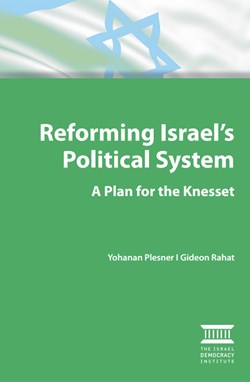Reforming Israel's Political System: A Plan for the Knesset
- Written By: Yohanan Plesner , Prof. Gideon Rahat
- Publication Date:
- Number Of Pages: 27 Pages
- Center: Political Reform Program
An English adaptation of Hebrew policy recommendations on political reform distributed to Israeli decision makers in the period leading up to the elections for the 20th Knesset in 2015.
This booklet by IDI President Yohanan Plesner and IDI Senior Fellow Prof. Gidi Rahat is an English adaptation of a set of Hebrew policy recommendations distributed to Israeli decision makers in the period leading up to the elections for the 20th Knesset in 2015.
The recommendations are based on a comprehensive set of proposals for electoral reform in Israel developed on the basis of research conducted by IDI's political reform research team from 2009 to the present and on the deliberations of IDI's Forum for Political Reform in Israel, which was headed by Justice Meir Shamgar. The full set of recommendations can be found in Reforming Israel’s Political System, edited by Gideon Rahat, Shlomit Barnea, Chen Friedberg, and Ofer Kenig, which was published in 2013 by the Israel Democracy Institute and Am Oved (Hebrew).
Since implementation of the full set of necessary reforms will take many years, IDI isolated a more specific series of changes that could have far-reaching implications for Israeli governance and pave the way for further reform. The reforms described at the beginning of the booklet pertain to the procedures by which governments are formed and dissolved. These measures, in conjunction with changes to the electoral system and party structure that are presented later in the booklet, are designed to promote stability and improve governance.
Download "The Cabinet in (com)Motion to learn better understand the necessity of political reform>>
About this Booklet
- The Challenge
- Proposed Solutions
- Advantages and Disadvantages of these Proposals
- Additional Reforms
- Appendix 1: The Fragmentation of the Israeli Party System
- Appendix 2: Mechanisms for Government Formation and Dissolution: An International Comparison
- Acknowledgments
Three changes in the way that governments are formed and brought down in Israel are proposed:
- After a general election, the head of the largest Knesset faction will become the Prime Minister automatically.
- The new government formed by the Prime Minister will no longer require confirmation by a parliamentary vote of investiture.
- The continued tenure of an incumbent Government will not depend on Knesset approval of the State budget.
Since these measures may result in the formation of minority governments, it is important to include a number of safety valves that will protect against a political impasse, in which a stable government is incapable of governing. We recommend retaining the following mechanisms to prevent political deadlock:
- Dissolution of the government by a constructive vote of no confidence – As a result of previous reforms passed with the backing of IDI, it is currently possible to topple the government through a vote of no-confidence in the Knesset, but only by presenting a viable, alternative coalition supported by an absolute majority of the Knesset (at least 61 members). We recommend retaining this provision.
- Dissolution of the government by the Prime Minister – As currently stipulated in the Basic Law: The Government, the Prime Minister would be able to dissolve the Knesset, in consultation with the President. This would lead to new elections.
- Self-Dissolution of the Knesset triggering early elections (optional) – An additional safety valve, currently in effect in Israel, enables an absolute majority of the Knesset members to dissolve the parliament and call early elections. The authors of this proposal disagree on the merit of this safety valve. On the one hand, it threatens governmental stability and could undermine the utility of the other reforms proposed here. On the other hand, it would provide a counterbalance to the increased power of the executive branch stemming from these reforms. In any event, if this safety valve is eliminated, the Knesset should be compensated with increased powers of oversight over the executive branch, as outlined in IDI's comprehensive plan for political reform.
These proposals offer a potent remedy for governmental instability in Israel. Future governments will be formed immediately following an election by the head of the largest faction, who will not require a parliamentary vote of investiture in order to establish his/her government. The parliament will retain its power to topple the government, but only by offering a constructive alternative supported by an absolute majority of Knesset members. The opposition will no longer be able to hold the government hostage to annual budget approval processes, and small parties will lose much of their power to extort concessions from the ruling party in the aftermath of an election. Future prime ministers, freed of the political sword of Damocles hanging over their head, will be able to build stable coalitions and formulate and implement policies designed to further the national interest.
Yohanan Plesner is the President of the Israel Democracy Institute and a former Member of Knesset.
Prof. Gideon Rahat is a Senior Fellow at the Israel Democracy Institute and Director of IDI's Political Reform Program. He is a member of the faculty of the Political Science Department at the Hebrew University of Jerusalem and is an expert on Israeli politics and comparative politics.


